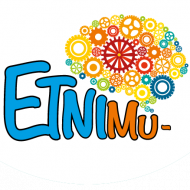Erikieliset materiaalit
Tältä sivulta löydät englanninkieliset materiaalit.
Improving brain health!
Dementing illnesses and the deterioration of brain health are not dependent on language, culture or nationality. This guidebook is addressed to group leaders promoting the mental well-being of immigrants living in Finland and having a different cultural background. It is also meant for aging immigrants, who are interested in improving their brain health and memory-related problems.
Various information on memory and its functioning have been widely published in Finland. This guidebook covers all the key topics and is easy to read and understand. The guidebook is based on the content of courses organized in the frame of the ETNIMU-project in 2015–2016. According to the languages of the courses, the guidebook is also published in four languages: Finnish, Estonian, Russian and Somali – and now also in English .
The guidebook is supported by two booklets; Exercises to Activate the Brain 1 & 2, which are recommended to be used together with this book. The guidebooks are a tool for group leaders helping to arrange respective activities in their groups.
We have discussed the content of this guidebook with experts in various fields, whose contribution to the guidebook has been invaluable. For that we sincerely thank them! Our sincere thanks also to the ETNIMU project team, our partners, and the Society for Memory Disorders Expertise in Finland for their assistance with and contribution to the book.
- Information on memory
- Brain health
- Memory disorders, dementing illnesses and dementia syndrome
- The happy brain remembers best
- Senses
- Physical activity
- Outdoors
- Nutrition
- Sleep and sleep disorders
- How to engage with persons suffering from dementing illnesses
- Behavioral changes of persons with dementing Illnesses
- Warning signs of dementing Illnesses
Exercises to activate the brain 1
This booklet is addressed to group leaders improving the mental well-being of elderly immigrants in Finland. The booklet contains 22 coordination and concentration exercises that support brain health by improving interaction between the brain and muscles. Because the brain needs activation.
Even a small amount of physical activity and exercising may be critical for the quality of life. Aging impairs the ability to control muscles and movements. With regular exercise, we can slow these changes.
Exercise also improves mental well-being and supports memory. It is good to challenge yourself and to do something you have never tried before. New skills open new connections in the brain. The training of concentration skills promotes the functioning of memory in everyday chores.
An active lifestyle and social relationships are critical for maintaining brain health. Do these exercises in a group or alone at home. By exercising together, you get support from the others, and you may unexpectedly find yourself bursting out laughing, which is the best medicine ever. Learning a new movement is easier when exercising is fun, and when you repeat the movement for several times.
The exercises are designed to go from easy to more difficult ones. The difficulty levels may also be increased by using different directions for the movements or including other body parts in the exercise, for example, by combining leg movements with arm movements. Exercises may be done either while sitting down or standing up. Create together with your group new moves and exercises.
Exercises to activate the brain 2
This guidebook is addressed to group leaders aiming to improve the mental well-being of ethnic minority elderly in Finland. In this booklet, you find 26 different exercises for brain stimulation. From these exercises, you may create new ones for your group.
Memory training is a new trend in improving mental health. Every one of us can improve how the brain works. There is no good or bad memory. Our memory is working selectively by choosing only things that interest us most. By training perception and concentration, we can store the necessary information in our memory better if it is connected with emotions.
The easiest way to train memory is to focus on what we do, to develop a systematic approach, creativity, and imagination. Memory training is not so much about focusing on memory, but rather learning how to use memory by finding connections between information to be stored and information already known to us. When we see these connections and associations, remembering is easy.
Keeping your -body active guarantees physical health, but memory training has proven necessary and useful too. Memory exercises support and enhance our mental abilities. Although you may do the exercises presented in this booklet on your own, the joy of being together in a group makes you feel good and creates a pleasant feeling of being united with other people.
The exercises are designed to be used primarily for group lessons and co-creating conversations on selected topics, word games, manual activities (such as coloring) and adding new activities. Tasks and physical exercises may be combined to make the lesson even more vivid and versatile.
Täältä löydät kaikki ETNIMU-toiminnassa eri kielillä julkaistut materiaalit. Maksuttomat oppaamme on tarkoitettu kaikille aivoterveydestä, muistityöstä ja sen kehittämisestä kiinnostuneille. Valitse ylävalikosta haluamasi kieli ja tutustu materiaaleihimme.
Osa suomenkielisistä materiaaleista on laadittu selkokielellä yhteistyössä selkokeskuksen kanssa.
| Kansi | Nimi | Kieli |
|---|---|---|
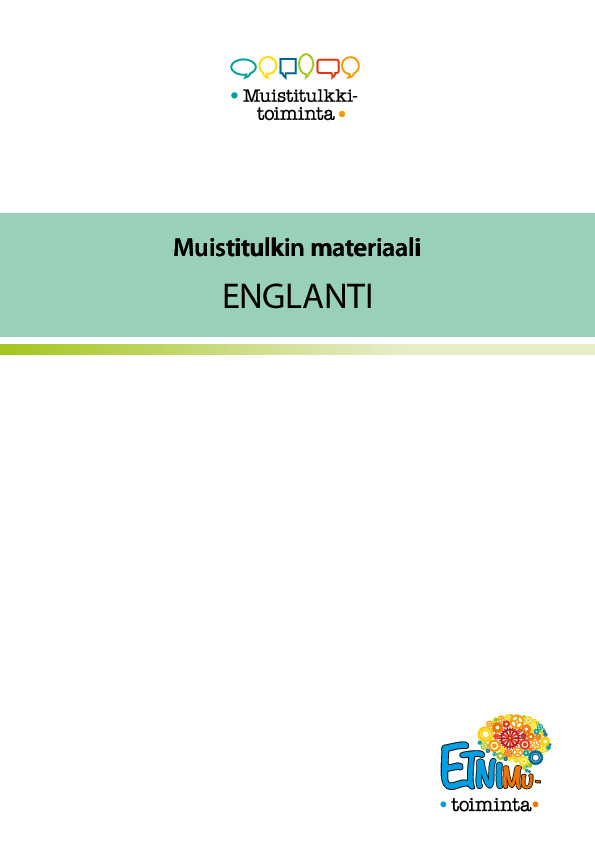 | Muistitulkin materiaali Englanti | englanti |
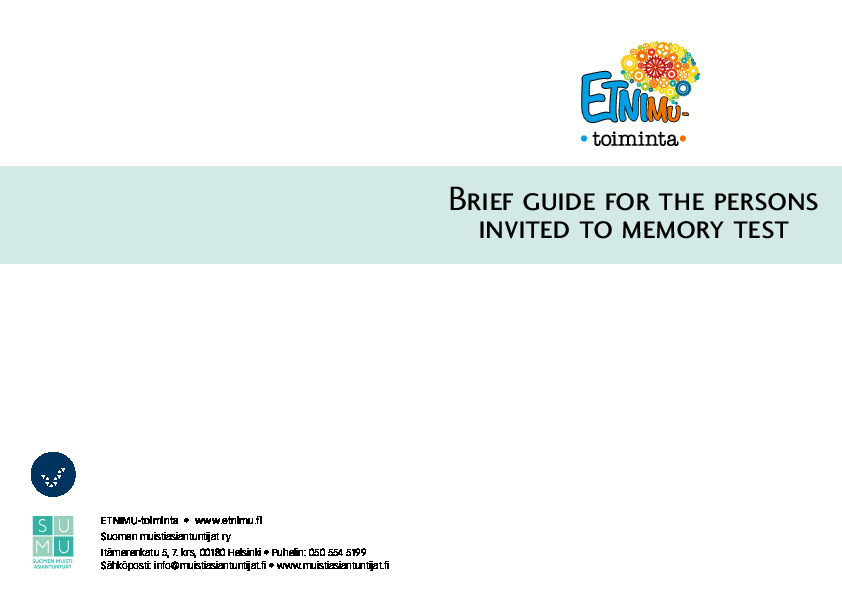 | Brief guide for the persons invited to memory test | englanti |
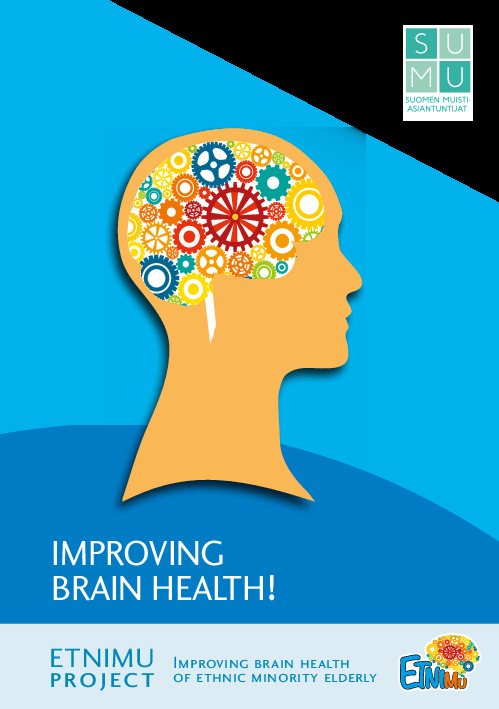 | Improving brain health Jaakson S, Jaakkola U. | englanti |
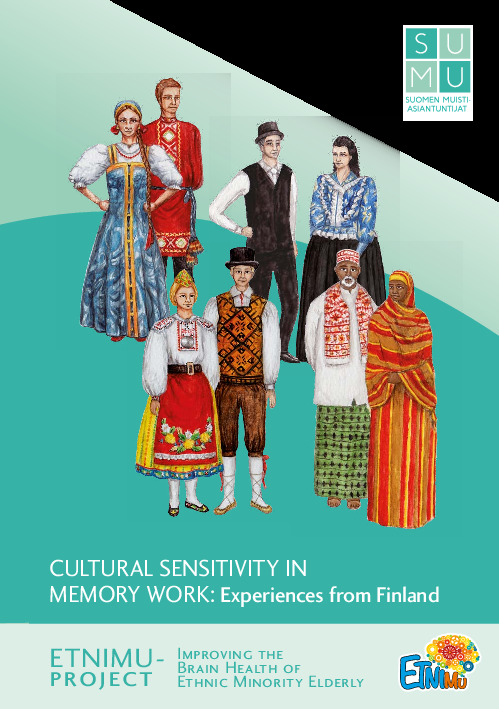 | Cultural Sensitivity in Memory Work Jaakson S, Hemmilä E, Jaakkola U. | englanti |
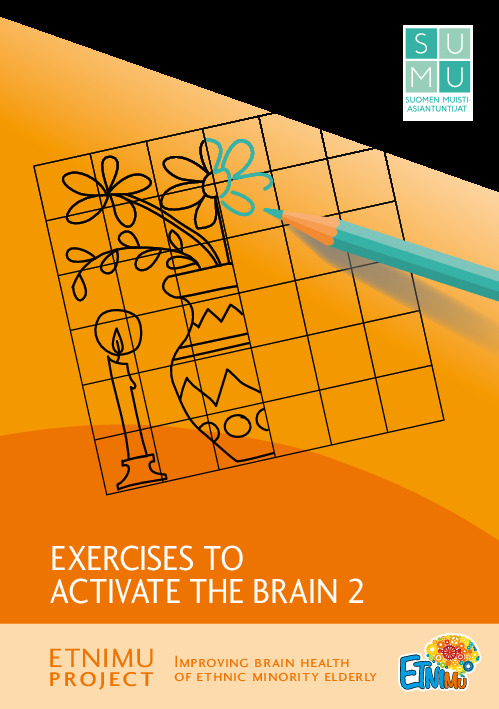 | Exercises to activate the brain 2 Jaakson S, Jonuks A, Jaakkola U. | englanti |
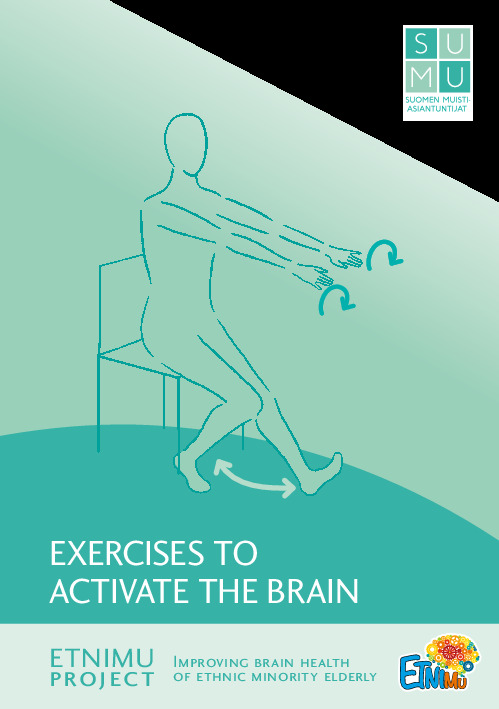 | Exercises to activate the brain 1 Jaakson S, Rönkkö E, Jaakkola U. | englanti |
